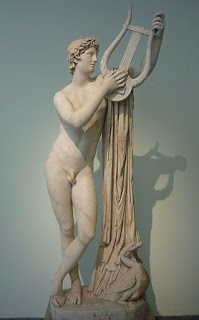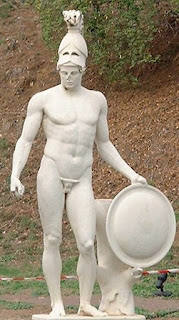In Greek mythology, there are twelve Olympians Gods in the Greek pantheon, and another The seven that sometimes included as one of the twelve Olympians. They are residing atop a mythical Mount Olympus. The twelve as most commonly portrayed in art and poetry were Zeus, Hera, Poseidon, Demeter, Athena, Apollo, Artemis, Ares, Aphrodite, Hephaestus, Hermes and either Hestia, or Dionysus. Hades, was not usually included among the Olympians because his realm was the underworld.
Here is a detailed list of Greek Gods:
Zeus: He is the king of the gods and ruler of Mount Olympus. He is god of the sky, lightning, thunder, law, order, justice. Zeus is the youngest child of Cronus and Rhea, though sometimes reckoned the eldest as the others required disgorging from Cronos's stomach. In most traditions, he is married to Hera, by whom he is usually said to have fathered Ares, Hebe, and Hephaestus. Symbols include the thunderbolt, eagle, oak tree, scepter, and scales. Brother and husband of Hera, although he had many lovers, also brother of Poseidon, Hades, Demeter, and Hestia.
Hera: Queen of the gods and the goddess of marriage and family. Symbols include the peacock, cuckoo, and cow. Youngest daughter of Cronus and Rhea. She is the wife and one of three sisters of Zeus. Hera was known for her jealous and vengeful nature against Zeus's lovers and offspring, but also against mortals who crossed her, such as Pelias. Paris also earned Hera's hatred by choosing Aphrodite as the most beautiful goddess.
Poseidon: God of the seas, earthquakes, and tidal wave. He is referred to as "Earth-Shaker" due to his role in causing earthquakes, and has been called the "tamer of horses". Poseidon was the second son of titans Cronus and Rhea. In most accounts he is swallowed by Cronus at birth but later saved, with his other brothers and sisters, by Zeus. Symbols include the horse, bull, dolphin, and trident. Middle son of Cronus and Rhea. Brother of Zeus and Hades. Married to the Nereid Amphitrite, although, like most male Greek Gods, he had many lovers.
Demeter: Goddess of fertility, agriculture, nature, and the seasons. Symbols include the poppy, wheat, torch, cornucopia, and pig. Middle daughter of Cronus and Rhea. Demeter's virgin daughter Persephone was abducted to the underworld by Hades. She has eight children: Persephone, Despoina, Arion, Plutus, Philomelus, Eubuleus, Chrysothemis and Amphitheus. In addition some sources also include Dmia as 9th child.
Athena: Goddess of wisdom, courage, inspiration, civilization, law and justice, mathematics, strength, war strategy, the arts, crafts, and skill. Symbols include the owl, the olive tree, snake, Aegis, armor, helmets, spears, and Gorgoneion Daughter of Zeus and the Oceanid Metis, she rose from her father's head fully grown and in full battle armor after he swallowed her mother. Athena is known for her calm temperament, as she moves slowly to anger. She is noted to have only fought for just reasons, and would not fight without a purpose. Athena is portrayed as a shrewd companion of heroes, such as Hercules.
Aphrodite: Goddess of love, beauty, pleasure, procreation, and desire. Symbols include the Dolphin, Rose, Scallop Shell, Myrtle, Dove, Theogony, she was born when Cronus cut off Uranus's genitals and threw them into the sea, and she arose from the sea foam (aphros). According to Homer's Iliad, she is the daughter of Zeus and Dione. Because of her beauty, other gods feared that she would interrupt the peace among them and lead to war. Thus, Zeus married her to Hephaestus, who, because of his ugliness and deformity, was not seen as a threat. Aphrodite had many affairs with gods, such as Ares, and men, such as Anchises. Sparrow, Girdle, Mirror, and Swan. There are two main stories about her origin.
Hermes: Messenger of the gods; god of commerce, thieves, eloquence and streets. He is described as quick and cunning, moving freely between the worlds of the mortal and divine. He is also portrayed as an emissary and messenger of the gods: an intercessor between mortals and the divine, and conductor of souls into the afterlife. Symbols include the caduceus (staff entwined with two snakes), winged sandals and cap, stork, and tortoise (whose shell he used to invent the lyre). Son of Zeus and the nymph Maia. The second-youngest Olympian, just older than Dionysus. He has six children: Pan, Hermaphroditus, Tyche, Abderus, Autolycus, and Angelia.
Hestia: Goddess of the hearth, architecture, and the right ordering of domesticity, the family, and the state. She was born into the first Olympian generation and was one of the original twelve Olympians. Some lists of the Twelve Olympians omit her in favor of Dionysus, but the speculation that she gave her throne to him in order to keep the peace seems to be modern invention. She was a daughter of the Titans Rhea and Cronus, and sister to Zeus, Poseidon, Demeter, Hera, and Hades. Hestia rejects the marriage suits of Poseidon and Apollo, and swears herself to perpetual virginity. Zeus assigns Hestia a duty to feed and maintain the fires of the Olympian hearth with the fatty, combustible portions of animal sacrifices to the gods.
Dionysus: God of wine, celebrations, and ecstasy. Patron god of the art of theatre. Symbols include the grapevine, ivy, cup, tiger, panther, leopard, dolphin, goat, and pinecone. Dionysus had a strange birth that evokes the difficulty in fitting him into the Olympian pantheon. His mother was a mortal woman, Semele, the daughter of king Cadmus of Thebes, and his father was Zeus, the king of the gods. Married to the Cretan princess Ariadne. The youngest Olympian god, as well as the only one to have a mortal mother.
Here is a detailed list of Greek Gods:
 |
| Zeus. |
Hera: Queen of the gods and the goddess of marriage and family. Symbols include the peacock, cuckoo, and cow. Youngest daughter of Cronus and Rhea. She is the wife and one of three sisters of Zeus. Hera was known for her jealous and vengeful nature against Zeus's lovers and offspring, but also against mortals who crossed her, such as Pelias. Paris also earned Hera's hatred by choosing Aphrodite as the most beautiful goddess.
 |
| Poseidon. |
Demeter: Goddess of fertility, agriculture, nature, and the seasons. Symbols include the poppy, wheat, torch, cornucopia, and pig. Middle daughter of Cronus and Rhea. Demeter's virgin daughter Persephone was abducted to the underworld by Hades. She has eight children: Persephone, Despoina, Arion, Plutus, Philomelus, Eubuleus, Chrysothemis and Amphitheus. In addition some sources also include Dmia as 9th child.
 |
| Greek God Apollo. |
Apollo: God of light, prophecy, inspiration, poetry, music and arts, medicine and healing. Son of Zeus and Leto. Symbols include the Lyre, laurel wreath, python, raven, bow and arrows Twin brother of Artemis. Apollo was an oracular god, the prophetic deity of the Delphic Oracle. Medicine and healing are associated with Apollo, whether through the god himself or mediated through his son Asclepius. Apollo became associated with dominion over colonists, and as the patron defender of herds and flocks. As the leader of the Muses and director of their choir, Apollo functioned as the patron god of music and poetry. He has four children: Asclepius, Troilus, Aristaeus, and Orpheus.
Artemis: Goddess of the hunt, wild animals, wilderness, childbirth, virginity and protector of young girls, bringing and relieving disease in women. In Greek mythology, Artemis was often described as the daughter of Zeus and Leto, and the twin sister of Apollo. Symbols include the moon, deer, hound, she-bear, snake, cypress tree, and bow and arrow. The deer and the cypress were sacred to her.
Ares: God of war, violence, and bloodshed. Symbols include the boar, serpent, dog, vulture, spear,
and shield. Son of Zeus and Hera, all the other gods, except Aphrodite, didn't like him. The deer and the cypress were sacred to her. Ares plays a limited role in Greek mythology. However, he has numerous love affairs and abundant offspring are often alluded to. When Ares does appear in myths, he typically faces humiliation. Famous children include: Erotes (Eros and Anteros), Phobos, Deimos, Phlegyas, Harmonia, and Adrestia.
and shield. Son of Zeus and Hera, all the other gods, except Aphrodite, didn't like him. The deer and the cypress were sacred to her. Ares plays a limited role in Greek mythology. However, he has numerous love affairs and abundant offspring are often alluded to. When Ares does appear in myths, he typically faces humiliation. Famous children include: Erotes (Eros and Anteros), Phobos, Deimos, Phlegyas, Harmonia, and Adrestia.
 |
| Greek God Aris. |
Hephaestus: God of blacksmiths, craftsmen, artisans, sculptors, metals, metallurgy, fire and volcanoes. Symbols include fire, anvil, axe, donkey, hammer, tongs, and quail. In Greek mythology, as a smithing god, Hephaestus made all the weapons of the gods in Olympus. He served as the blacksmith of the Greek gods. Hephaestus was the son of Zeus and Hera, although in another version, he was Hera's parthenogenous child, rejected by his mother because of his deformity and thrown out of heaven and down to earth. She married to Aphrodite, though unlike most divine husbands, he was rarely ever licentious.
 |
| Greek God Hermes. |
Hestia: Goddess of the hearth, architecture, and the right ordering of domesticity, the family, and the state. She was born into the first Olympian generation and was one of the original twelve Olympians. Some lists of the Twelve Olympians omit her in favor of Dionysus, but the speculation that she gave her throne to him in order to keep the peace seems to be modern invention. She was a daughter of the Titans Rhea and Cronus, and sister to Zeus, Poseidon, Demeter, Hera, and Hades. Hestia rejects the marriage suits of Poseidon and Apollo, and swears herself to perpetual virginity. Zeus assigns Hestia a duty to feed and maintain the fires of the Olympian hearth with the fatty, combustible portions of animal sacrifices to the gods.